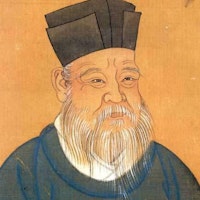Carefully uphold the proper norms of conduct, and imitate them day and night… After a time, we become familiar with them, and then we no longer need to imitate them but can make our own standard.
Zhu Xi

Uphold the Proper Norms
Topic: Spiritual Growth & Practice
Carefully uphold the proper norms of conduct, and imitate them day and night so that there will not be a moment’s neglect or cessation. After a time, we become familiar with them, and then we no longer need to imitate them but can make our own standard.
Zhu Xi (born October 18, 1130, in Youxi, Fujian Province, China – died April 23, 1200, in Chunan, Zhejiang Province, China) was one of the most influential philosophers, teachers, and scholars of the Song dynasty. A leading figure in Neo-Confucianism, Zhu Xi sought to renew and deepen the moral and metaphysical teachings of Confucius and Mencius, integrating them with Buddhist and Daoist insights into a unified vision of human nature and the cosmos. His early education was guided by his father and local scholars, and by his teenage years, Zhu Xi had already gained a reputation for intellectual rigor and moral seriousness. He passed the highest level of the imperial examinations at age nineteen, marking the beginning of a life devoted to scholarship and service.
Throughout his career, Zhu Xi combined official responsibilities with an enduring commitment to teaching and contemplation. He established academies where students engaged not only in study but in moral cultivation and community life. His reinterpretation of the Four Books—the Analects, Mencius, Great Learning, and Doctrine of the Mean—became the foundation for civil service education in China for centuries. Zhu Xi emphasized li (principle) as the underlying order of the universe and qi (vital energy) as its material expression, teaching that true wisdom comes through quiet reflection and disciplined self-cultivation. His method of “investigating things” (gewu) invited students to seek harmony between inner clarity and the natural world.
Zhu Xi’s influence extended far beyond his lifetime. Though his ideas were initially contested, his commentaries eventually shaped the moral and intellectual life of East Asia, profoundly influencing Korean, Japanese, and Vietnamese traditions as well. He is remembered not only as a philosopher but as a moral exemplar—humble in spirit, devoted to learning, and grounded in the conviction that truth must be lived, not merely known. Zhu Xi’s vision of harmony between principle and practice continues to inspire reflection on how human beings may cultivate virtue and align with the deeper order of the universe.
Further Reflection on Things at Hand
Wilson, Andrew, editor. World Scripture II. Universal Peace Federation, 2011, [Chu Hsi, Self Cultivation #41].

Zhu Xi
Theme: Spiritual Growth

Chu Hsi “Self Cultivation #41”
Three Additional Passages by Chu Hsi
Resources
Related Quotes
Copyright © 2017 – 2026 LuminaryQuotes.com About Us